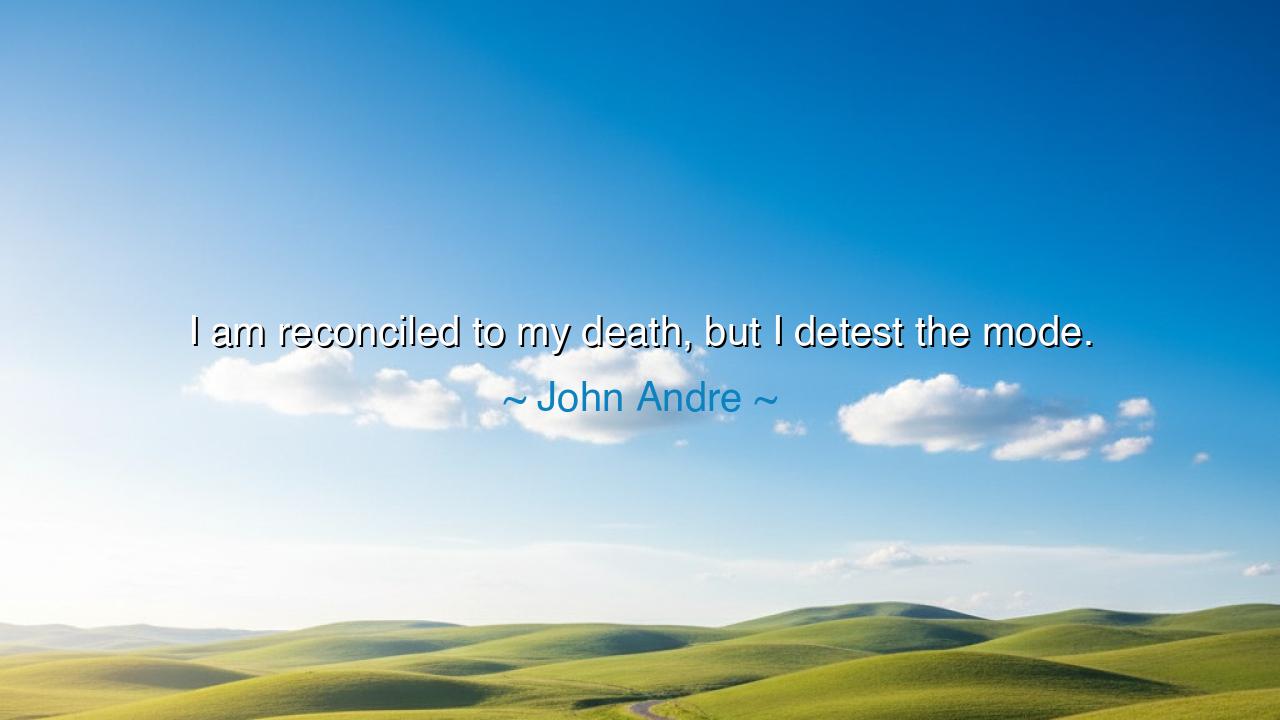
I am reconciled to my death, but I detest the mode.






“I am reconciled to my death, but I detest the mode.” — thus spoke Major John André, officer of the British Army, poet, and spy, on the morning of his execution in 1780. In this single line, uttered with calm and dignity before the hangman’s noose, lies the voice of a man who met fate not with terror, but with grace — and yet whose heart rebelled against the indignity of its form. For André, death was not the enemy; dishonor was. He had made his peace with mortality, but he could not make peace with the manner in which it came — a death by hanging, the sentence of a common criminal, not the noble end of a soldier. His words capture one of the oldest human struggles: to face the inevitable with courage, while lamenting the humiliation that often attends it.
The origin of this quote lies in one of the most poignant episodes of the American Revolutionary War. Major John André was captured behind enemy lines while conspiring with Benedict Arnold, the American general who plotted to betray West Point to the British. When André was seized, papers hidden in his boot revealed his role in the scheme. Tried by an American military tribunal, he was found guilty of espionage. Yet those who saw him in his final days — even his captors — were struck by his gentility, composure, and humanity. He conducted himself not as a villain, but as a gentleman-soldier caught in the machinery of war. When he learned that he would be hanged rather than executed by firing squad, he uttered these immortal words: “I am reconciled to my death, but I detest the mode.”
In these words lies a deep and timeless truth. To be reconciled to death is to reach that state of acceptance that all wise souls eventually seek — to recognize that life must, at last, yield to eternity. But to detest the mode is to express the ache of the human heart that longs for dignity, even in defeat. André did not fear death itself — he feared dying without honor. In this, he revealed that death, though universal, is not all the same. The wise and the brave do not cling to life, but they do yearn to meet their end in a manner worthy of the lives they have lived.
The ancients understood this sentiment well. The Roman philosopher Seneca, condemned to die by order of Nero, accepted his fate without protest. Yet even as he opened his veins, he sought to die as a philosopher, not as a slave. Socrates, too, drank the hemlock with serenity, but not without ensuring that his last words were a lesson — a message to his disciples that even in death, one must remain true to one’s character. André’s spirit belongs to this same lineage: he faced the end with composure, but he grieved that he could not die as a soldier, struck down by musket fire in a blaze of courage, but as a spy — silent, bound, and shamed upon the gallows.
There is also a paradox of beauty in his lament. By expressing his disdain for the mode of death, André affirmed his love for honor more than for life itself. He chose not to plead for mercy, though his charm and grace might have won it; he refused to deny his mission, though confession might have spared him. He walked to the scaffold with steady step and clear eyes, earning the admiration of even those who condemned him. George Washington, who signed his death order with great reluctance, wrote afterward that André’s conduct moved all who beheld it. In dying with such composure, André transcended the disgrace he feared. The noose could bind his body, but not his reputation. His words, born of sorrow, became the proof of his courage.
Thus, his quote stands as a meditation on the nature of death and dignity. It reminds us that though we cannot always choose how or when we die, we can always choose how we meet death — with fear or with fortitude, with bitterness or with acceptance. The mode may be unjust, humiliating, or painful, but the soul’s bearing toward it can transform it into something noble. The external circumstances of fate are not ours to command; the inner posture of our hearts is. André’s lament, therefore, is not weakness — it is humanity made eloquent, courage made tender.
So, my child, let this be the lesson: life may not grant you a warrior’s death, nor will it always honor you as you deserve. Yet you must live, and if the moment comes, die, as one who has kept faith with their own ideals. Be reconciled to the end that awaits all mortals, but never surrender your sense of dignity. The world may dictate the mode, but you dictate the meaning. And if, like André, you must fall in circumstances not of your choosing, let your conduct in that moment be your true victory — for how you face death reveals the measure of your soul far more than the manner in which death claims you.
For as John André teaches us, courage is not in conquering death, but in meeting it with grace. Fate may rob you of choice, but not of honor. And in the end, though the body falls by the mode imposed upon it, the spirit, steadfast and unbroken, rises — free, eternal, and forever remembered.






AAdministratorAdministrator
Welcome, honored guests. Please leave a comment, we will respond soon